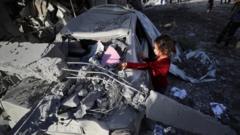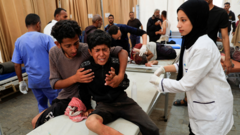In a series of strikes across Gaza, Israeli military actions have resulted in at least 80 civilian deaths, including numerous children, prompting condemnation from UN officials and a plea for humanitarian aid access. The conflict intensifies, with reports of severe shortages in food and medical supplies.
Escalating Violence: Israeli Strikes in Gaza Result in Significant Civilian Casualties

Escalating Violence: Israeli Strikes in Gaza Result in Significant Civilian Casualties
Recent Israeli air strikes in Gaza lead to a devastating toll on civilians, igniting an urgent call for international intervention amid worsening humanitarian crisis.
At least 80 people have died due to Israeli air strikes across Gaza, with hospitals and civil defense officials confirming multiple casualties, including children and women. The Indonesian hospital reported 22 children and 15 women among 50 fatalities in the northern Jabalia region, where several homes were demolished overnight. Al-Awda hospital also noted it received nine bodies, seven of whom were minors.
The Israeli military stated it targeted Hamas and Palestinian Islamic Jihad operatives, highlighting prior warnings to Jabalia residents to evacuate following rocket launches into Israel. As tensions escalate, UN humanitarian chief Tom Fletcher urged the UN Security Council to intervene, accusing Israel of imposing severe conditions on civilians, criticized the proposed takeover of aid distribution by private firms as a mere pretext for further violence.
Israel's representative at the UN dismissed these claims as unfounded, asserting that the current aid system had been exploited to support Hamas. Residents reported hearing multiple explosions, while videos depicted destruction and chaos. One resident, Hadi Moqbel, recounted family members killed in strikes, describing the scene of death and destruction.
With hospitals overwhelmed and medical supplies critically low, the director of al-Awda reported struggles with treating the injured. The Hamas-run Civil Defense agency indicated 80 deaths from the strikes, with the Israeli military maintaining measures were in place to protect civilians.
Recent military action followed Israeli notifications to residents to flee, as renewed hostilities broke out after a two-month ceasefire ended earlier this month. The UN reported significant displacement, with a staggering three-quarters of Gazans either within military-imposed zones or under evacuation orders. Critical shortages of food and fuel persist, leading to widespread closures of UN-supported aid facilities, fueling an acute food crisis.
Hamas's recent release of an Israeli-American hostage is seen as a possible precursor for renewed diplomatic engagement amid hopes for a ceasefire. US President Donald Trump indicated optimism about freeing more hostages during talks with Gulf leaders.
Israeli Prime Minister Benjamin Netanyahu reaffirmed the continuation of military operations targeting Hamas, asserting an unwavering commitment to the offensive despite rising civilian casualties. Strikes, including a recent attack on a hospital in Khan Younis that killed at least 28, underscore the grim humanitarian context amidst this conflict.
The toll from the violence has surpassed 52,928 fatalities in Gaza since hostilities escalated, with ongoing discussions among international mediators emphasizing the urgency for peace negotiations. The conflict continues to raise profound humanitarian concerns requiring immediate global attention.





















